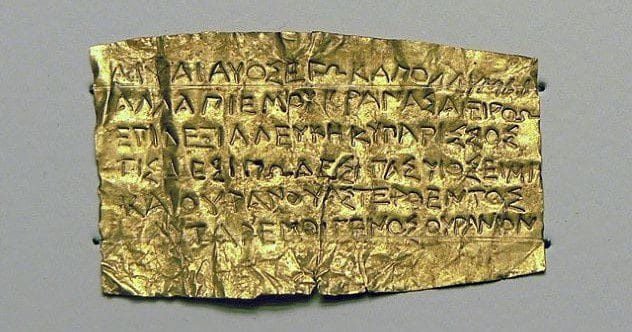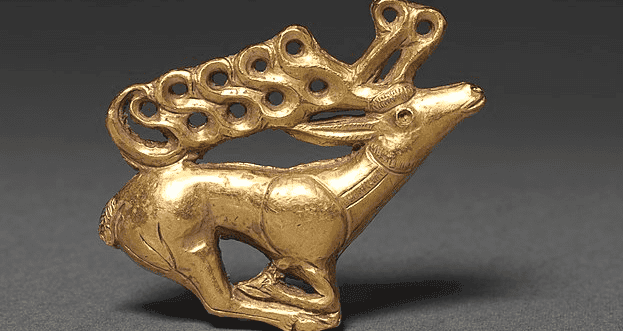Gold. Just the word itself conjures images of shimmering treasure and divine power. For millennia, this radiant metal has captivated humanity. Unlike other metals, gold often appears in nature pure, gleaming as if by magic. It doesn’t tarnish or corrode, meaning golden artifacts can survive for thousands of years, looking almost as brilliant as the day they were crafted. It’s no wonder ancient cultures often linked gold to gods and immortality.
Because gold endures, it offers us a unique window into the past. Many of the most breathtaking relics from antiquity are made of this precious material. Join us as we unveil ten golden objects that illuminate the splendor and ingenuity of ancient worlds.
10. Priam’s Treasure
Heinrich Schliemann, a name both celebrated and criticized in archaeology, embarked on a quest fueled by Homer’s Iliad. While most 19th-century scholars dismissed the Trojan War as myth, Schliemann believed it was history waiting to be unearthed. He poured his personal fortune into excavating Hissarlik in modern-day Turkey, convinced it was the site of ancient Troy.
His controversial methods involved digging straight down, damaging layers of history in his hunt for proof. Yet, Schliemann struck gold—literally. He uncovered a remarkable hoard of gold and silver items, which he sensationally named “Priam’s Treasure,” after Troy’s legendary king. Among these were stunning diadems crafted from countless tiny pieces of hammered gold. Famously smuggled out of Turkey, this treasure eventually found its way to Germany, only to be taken by Soviet forces after World War II. It remains in Russia today, a testament to turbulent history.
9. Orphic Gold Tablets

Peering into the burial customs of ancient religions can be a challenging puzzle for archaeologists. Often, only fragments of bone and a few grave goods provide clues. However, in the Classical world, sometimes the deceased were buried with written messages, offering rare insights. These texts, known as Totenpass (German for “Passport for the Dead”), were occasionally inscribed on thin sheets of gold.
These golden tablets contained inscriptions intended to guide the departed soul into a favorable afterlife. They appear in various ancient religions and cults, all sharing the goal of securing an eternal, blissful existence for the deceased. One remarkable example, sometimes called the world’s oldest book, consists of six decorated gold sheets bound together. Discovered in Bulgaria and dating to around 500 BC, its script is Etruscan, from the civilization that predated Roman dominance in Italy.
8. Muisca Raft
The dream of El Dorado, a land overflowing with gold, lured countless European explorers to South America. While most found their dreams unfulfilled, the continent was indeed home to sophisticated gold-working civilizations. Sadly, much of this Pre-Columbian artistry was melted down by conquistadors or plundered by grave robbers.
Yet, a small, extraordinary object in Bogota’s Gold Museum tells a powerful story: the Muisca Raft. Also known as the El Dorado raft, this intricate gold sculpture depicts figures on a raft. It’s believed to represent the ceremony that inspired the legend of El Dorado—the “Golden One.” The Muisca chief, as part of his investiture, was covered in gold dust and rowed to the center of a sacred lake. There, he would wash the gold from his body as an offering, along with other treasures of gold and emeralds. This stunning model of the ritual was found by farmers in 1969.
7. The Broighter Hoard
Boats held profound symbolic meaning in the ancient world, representing humanity’s ability to navigate treacherous waters. It’s not surprising, then, that several ancient cultures immortalized boats in gold. The Broighter Hoard, dating from the 1st century AD, is a prime example.
Discovered by plowing a field in Northern Ireland in 1896, the artifacts were given a cursory wash in a farmhouse sink—where some smaller pieces might have been lost. Sold to the British Museum, the hoard’s true significance quickly became apparent. It included a magnificent gold torc, a bowl, and a necklace of three gold strands. The star, however, was a meticulously crafted gold boat, complete with oars and seats for rowers. The boat’s presence suggests the hoard may have been an offering to Manannán mac Lir, an Irish sea god and lord of the underworld.
6. The Staffordshire Hoard
Some ancient hoards were ritual offerings to deities, while others served a more practical purpose: safekeeping. In times of danger, burying treasures was a common strategy, with the owner intending to retrieve them later. When they never returned, these hidden caches became historical time capsules.
The Staffordshire Hoard, unearthed in England, is the largest collection of Anglo-Saxon gold and silver ever found. It boasts over 11 pounds (5 kilograms) of gold and thousands of artifacts, many richly adorned with inlaid garnets. Dating to the 7th or 8th century, nearly all items, barring three religious pieces, are military-related. While the single gold sword fitting from Sutton Hoo was remarkable, the Staffordshire Hoard contains fifty such items. This vast wealth, given its quality and martial nature, likely represents spoils looted from defeated enemies after a significant battle.
5. Saka Gold
Nomadic tribes are often pictured as leading harsh, impoverished lives. However, the Saka people, horse lords of the Eurasian steppes during the 1st millennium BC, valued their horses immensely but also left behind incredibly rich material culture, particularly gold found in their burial mounds (kurgans).
The Saka constructed large mounds over the tombs of their deceased rulers, dominating the landscape. Excavations of these kurgans sometimes reveal astonishing quantities of gold. One tomb, Arzhan 2, yielded the remains of two central figures, 33 other individuals likely sacrificed to accompany their leader, and an astounding 9,300 gold objects weighing nearly 44 pounds (20 kilograms). Other Saka tombs are similarly opulent. Interestingly, when Arzhan 2 was excavated, archaeologists found evidence of an ancient attempt to loot the tomb, but the robbers had given up just short of their glittering prize.
4. Ram in a Thicket
The civilizations of Mesopotamia, nestled between the Tigris and Euphrates rivers, were among the world’s first to develop cities and writing, with Eridu founded around 5400 BC. Over millennia, these city-states grew powerful through trade and warfare, amassing great wealth which they displayed through a profound love for gold.
Housed in the British Museum, a captivating artifact known as the “Ram in a Thicket” gazes at visitors. More accurately a goat rearing against a flowering shrub, this exquisite piece is crafted from gold, shell, and lapis lazuli. It was discovered in the ancient Sumerian city of Ur, within the Royal Cemetery’s ominously named “Great Death Pit,” and dates back to around 2500 BC. Its exact purpose remains a mystery, though a pair was found, suggesting they might have served as ornate supports for a bowl or similar object.
3. Varna Man
The Varna culture flourished in present-day Bulgaria around 4500 BC and is renowned primarily through one archaeological site: the Varna Necropolis. Discovered accidentally in 1972, it was instantly recognized as an ancient monument of immense importance. Its 300 graves represent some of the oldest known burials where significant quantities of gold were interred with the dead.
One grave in particular, Grave 43, contained more gold artifacts than all other known finds from that period worldwide combined. The individual buried there, dubbed “Varna Man,” was adorned with gold discs sewn onto his clothing, heavy gold pendants, gleaming bracelets, axes with gold-sheathed handles, and even a gold penis sheath. Scholars debate Varna Man’s status; the richness of his grave goods suggests he might have been a powerful ruler, or perhaps a highly esteemed goldsmith, a craft equally valued in his society.
2. Gold Curse Tablets
Curse tablets are among the most intriguing texts surviving from the ancient world. Both Romans and Greeks would inscribe prayers or curses onto metal sheets, roll them up, and deposit them at sacred sites, hoping deities would act upon their wishes. Most were made of lead, but some individuals sought to better entice the gods by using precious gold.
In 2016, examples of such curses inscribed on gold and silver were found in Serbia. While many curse tablets are in Latin or Greek, with pleas like “May he who carried off Vilbia from me become as liquid as water,” the Serbian golden curses are more complex. These magical charms appear to use Aramaic words written with the Greek alphabet, making them particularly challenging to decipher fully but highlighting the diverse magical practices of the ancient world.
1. Gold Wizard Hats
Hats have long served as fashion statements or symbols of importance. What could be more striking than a hat crafted from pure gold, especially one towering nearly 2 feet (70 centimeters) tall? Several such large, conical gold headpieces have been discovered across Europe, dating from roughly 1400 to 800 BC.
Their extraordinary size is matched by their intricate decoration, which hints at their ceremonial and religious roles. Some of these golden hats were carefully buried in antiquity, underlining their immense value to their owners. The Berlin Gold Hat, the largest known example, is particularly fascinating as it also functions as a complex astronomical calendar. Its surface, adorned with bands of symbols representing the sun and moon, allowed initiated users to track a 19-year lunar cycle and even predict lunar eclipses, merging divine symbolism with sophisticated ancient science.
These golden artifacts are more than just beautiful objects; they are whispers from the past, telling tales of belief, power, artistry, and humanity’s enduring fascination with this most precious of metals. Each piece offers a tangible link to cultures that shaped our world.
Which of these golden treasures fascinates you the most? Do you know of other incredible ancient gold artifacts? Share your thoughts in the comments below!










